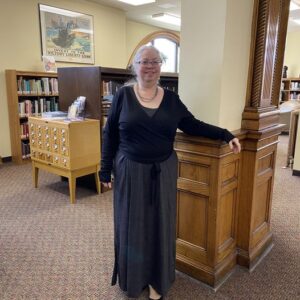 by Shelly Toler Franz
by Shelly Toler Franz
I think it’s every writer’s dream to see their book on a library shelf. As a public librarian who is friends with +/- a million authors, I’ve had the privilege of making a few of those dreams come true. Unfortunately, there are some limitations on what even I, as a Readers’ Advisory Librarian who also does Adult Fiction Collection Development, can do.
Backing up a bit, I’m a public librarian who also owns the Facebook group “Save Our Cozies.” I formed that group several years ago, when Penguin and Random House merged and decided there was a glut of cozy series on the market and started canceling and discontinuing them. Since cozy mysteries are my preferred escape from reality, I said a lot about this, and so did a lot of other people. As the frontwoman for the group, I ended up on a conference call with bigwigs from New York publishing, including the legendary Tom Colgan. I must have made at least a faint impression on someone, as Vicki Delany dedicated one of her Lighthouse Library series books to Save Our Cozies—and credits the group with the fact Crooked Lane picked up the series and it’s still going.
 We receive at least six emails a month from people who want us to add books to our collection. Sometimes, the emails are directly from authors, about their books and why they think we should add them to our library’s collection. Sometimes, they’re from patrons who want their favorite author added. And sometimes, they’re from authors pretending to be patrons.
We receive at least six emails a month from people who want us to add books to our collection. Sometimes, the emails are directly from authors, about their books and why they think we should add them to our library’s collection. Sometimes, they’re from patrons who want their favorite author added. And sometimes, they’re from authors pretending to be patrons.
Which brings me to the biggest thing not to do to get your book on your local public library’s shelves. Don’t lie to us. Don’t think you’re clever. Because I can tell you from personal experience that we’re good at figuring it out and it’s an almost guaranteed way to make sure we will not buy your book, even if it’s the next bestseller.
Most libraries in the United States purchase their books from one of two vendors, either Ingram or Baker & Taylor. My library uses Ingram. One of the first things I ask when someone requests I buy something is, “Is it available from my vendor?”
Many times, especially if it’s a TikTok author, the book is only available through Kindle Unlimited, or a similar program, and it isn’t possible for libraries to obtain a physical copy. The relationship between libraries and ebooks is a whole separate article, that I may get around to writing. Libraries are much more inclined to only order from our vendors, because we get a sizable discount—usually about forty-four percent. This beats anything Amazon can give us, and saves time, only dealing with one company.
A few rare times a book my library considered a “must-have” was only available from Amazon. We’ve ordered it, but as I said, this is rare and only happens when it’s judged our patrons will demand it in such numbers that not having it would be detrimental.
Another thing that can delay a book appearing on library shelves is lack of a cataloging record. Why is this important? Well, without it, a library doesn’t know where to categorize the book.
 For nonfiction, this tells a library where the book should go in the Dewey Decimal System. For fiction, this tells the cataloguer if it’s mystery, suspense, fantasy, etc. All that information goes into a library’s catalogue, which in turn, helps patrons and librarians find books on the shelves.
For nonfiction, this tells a library where the book should go in the Dewey Decimal System. For fiction, this tells the cataloguer if it’s mystery, suspense, fantasy, etc. All that information goes into a library’s catalogue, which in turn, helps patrons and librarians find books on the shelves.
So how does a book get a cataloging record? If the book is traditionally published, the publisher takes care of all of it. If not, this article explains it a lot better than I can.
Other entities make cataloguing records for either authors or libraries, but my experience with exactly how it works is limited to one example. A former director sent a book written by an in-state author to have a cataloguing record made for it. My library paid for the service because it was an in-state author I was personally acquainted with. I have no idea what it cost or what entity the director used to have it done. I remember it made the author cry happy tears when I told her!
Surprisingly, even books available via our vendors, will sometimes show up with either an incomplete (or bad) cataloging record, or none at all. That’s when the book gets set aside to wait until such a record is either completed or created. Many smaller libraries in the United States, do what is called “copy cataloging.” That is, they use the cataloging record from the Library of Congress, provided via whichever ILS (Integrated Library System) the specific library uses.
Once a book has a cataloging record, any library in the United States can use it. This makes one less hurdle toward getting a book on public library shelves.
Way back up at the beginning, I mentioned that I’m an Adult Fiction Collection Development specialist. What that means, is using my knowledge of adult fiction, our patrons, and our collection, I choose which adult fiction is purchased for my library every month. I’m also responsible for withdrawing materials that don’t circulate.
Collection Development specialists rely on reviews, word of mouth, and their own interests and knowledge to make selections, always with their annual budget in mind. We can’t afford to buy every new release, so we use information about what our patrons have requested, and what has given us good circulation numbers in the past. Sometimes, this can mean even if it’s a book we’re personally interested in, we don’t buy it because we know there isn’t the same level of interest for our patrons.
Would I like to buy every new cozy mystery release every month? Sure! But my patrons who prefer historical fiction or thrillers wouldn’t be very happy. There are always some authors we must buy, like Danielle Steel or James Patterson. Those heavy hitters deliver high circulation numbers so we can afford to, maybe, take a chance on a new author.
Shelly Franz specializes in Adult Collection Development and is the Adult Readers’ Advisory Librarian at the Dixon Public Library in Dixon, Illinois. A native Texan, the southern drawl remains. She’s lived in the Midwest, surrounded by corn fields for twenty years with an adoring husband and four feline hooligans.



Great article. Thank you for sharing this information!